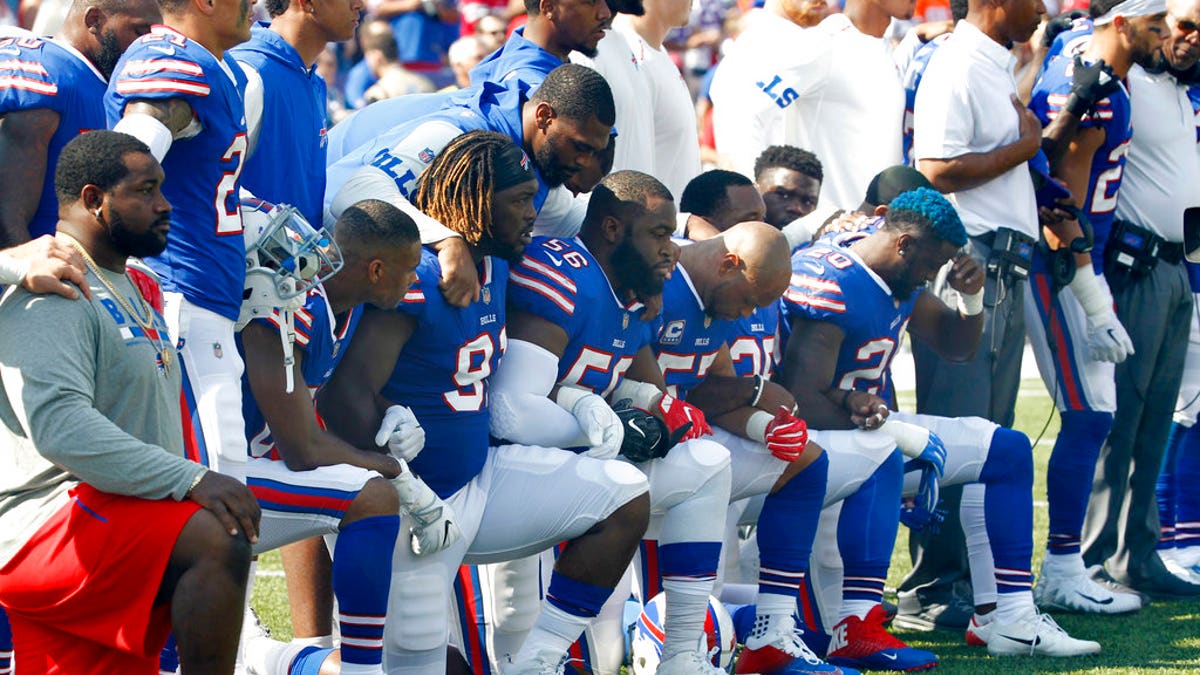
Buffalo Bills players take a knee during the national anthem Sept. 24 ahead of their game against the Denver Broncos. (AP Photo/Jeffrey T. Barnes)
Our country once again finds itself in the middle of a heated debate drawn largely along racial lines. President Trump, calling any NFL player who protests during the national anthem a “son of a bitch” met with widespread opposition over the weekend from professional athletes across the country, many of whom demonstrated their opposition by kneeling, joining hands or staying in the locker room while the national anthem was played before Sunday's football games.
But in the midst of the crossfire, there exists a middle ground. It’s possible to oppose both Trump’s rhetoric and demonstrations of disrespect to our national anthem, just as it’s possible to acknowledge a constitutional right to disrespect the anthem while criticizing the exercise of that right. They are two separate issues.
In many ways, the kneeling protest is emblematic of a dark shift in protest politics. Black Americans have a long history of speaking out against injustice, but our indignation with specific issues in America never shook our love of country. In his most famous speeches, Martin Luther King always had hope in the fundamental good of America — even during times when our nation fell short of guaranteeing equality for all. In fact, in 1964, 87 percent of blacks said America was worth fighting for. Now things have changed.
The conversation is no longer about making America truer to its creed. It’s about whether racism is built into the fabric of America. And if it is, shouldn’t we all kneel during the national anthem and discard our American flags? And shouldn’t I resign my commission as an Army officer and quit serving a country that is unequivocally dedicated to white supremacy?
As is the case with most contemporary questions, an honest review of history illuminates an answer.
If Frederick Douglass, born into slavery, could sharply criticize the sins of America while still believing in her fundamental goodness, how much more should we do so today?
In a few months, America will celebrate the bicentennial of Frederick Douglass’ birth. As a young free black, having recently escaped the bondage of slavery, Douglass joined the ranks of other New England abolitionists of his day who, following the lead of the abolitionist journalist William Lloyd Garrison, believed that the Constitution was inherently a pro-slavery document that undergirded a fundamentally evil nation worth dissolving.
Douglass wrote in his autobiography, “The Life and Times of Frederick Douglass”: “Brought directly, when I escaped from slavery, into contact with abolitionists who regarded the Constitution as a slaveholding instrument, and finding their views supported by the united and entire history of every department of the government, it is not strange that I assumed the Constitution to be just what these friends made it seem to be.”
But after bravely deciding to write his own periodical — a first for blacks at the time — Douglass’ views changed:
“My new circumstances compelled me to re-think the whole subject … By such a course of thought and reading I was conducted to the conclusion that the Constitution of the United States … could not well have been designed at the same time to maintain and perpetuate a system of rapine and murder like slavery, especially as not one word can be found in the Constitution to authorize such a belief.”
It’s not easy to miss the extraordinary irony of the situation. An educated free black disagreed with the great white abolitionists of the day and made a point that America’s founding document was not inherently racist — even at a time when millions of blacks were still in chains. He believed in America. If Frederick Douglass, born into slavery, could sharply criticize the sins of America while still believing in her fundamental goodness, how much more should we do so today?
Martin Luther King Jr. followed suit, often citing the Constitution and the Bible to condemn segregation. Like Douglass, King essentially exhorted America to be more American by truly living up to its creed that “all men are created equal.” But if a call to American values freed the slaves and ended segregation, it can lead to positive outcomes for blacks today.
It’s for that reason that I proudly put on my uniform every morning in service to our great nation. It’s also why #takeaknee is not only disrespectful to the men and women who died for our freedom, but antithetical to black history. If the past is any indication, it will take a higher degree of patriotism and more celebration of American values to truly ensure equality for all Americans.
